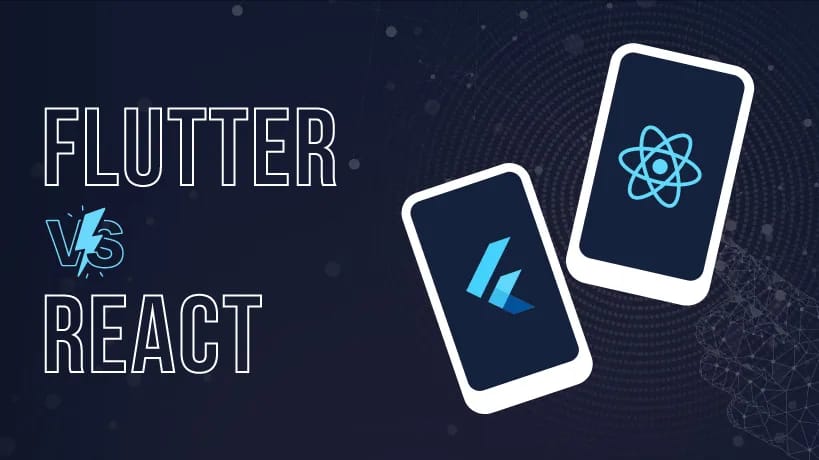React Native is truly based on Javascript which adds to its advantages. However, Flutter is based on a technology name Dart, that was introduced by Google in 2017. Even though both of them are cross-platform networks but their working patterns and usability for mobile apps differ in multiple ways.
Developers prefer using both of these miraculous technologies due to their increased compatibility, development duration, and other managing components. Apart from these traits, there is a lot more about what causes the flutter vs react native debate and which one you should choose for your next killer mobile app.
What is Flutter?
Besides being good for mobile app development, Flutter is also productive for web app development tasks. Shortly after its release, it became a top choice for developers due to its cross-platform compatibility and cross-functionality. The increased high performance and scalability make it even more effective for miscellaneous app development projects.
When most people ask about what is the difference between Flutter and react native, the most probable answer is that Flutter is preferred more for UI and business logic reasons. It has the best Google UI toolkit for flaunting your style to the end users
Undoubtedly, consistency hails the performance of all the apps you create using this platform no matter for which platform you create it. Not just that but Flutter also has a trail of advantages that might help you throughout the process.
What is React Native?
What are the differences in responsibilities of React Native programmer and Flutter programmer? It could be a subjective decision to choose between Flutter and react native since both are considered the best mobile development applications. These reasons will help you get a quick solution to this query.
Flutter VS React Native: Time to choose which one is best!
- Programming Language
The significant difference between Flutter and React Native is the programming language. Flutter is powered by Google and uses Dart language, whereas React Native has been founded on Javascript.
The contrast of languages is the main reason why most programmers prefer to use React Native and rarely few are familiar with Flutter.
- User Interface
Besides having native components for Android and iOS, React Native also has a UI/UX toolkit that allows designers to create customized appearances.
Flutter has a bunch of instilled structures, animation tools, widgets, and platforms for making visuals attractive. The difference is also that its built-in components replace the Native components.
- Functionality
There are no such major differences in the functionalities of the two but some differences make one more preferable than the other one. The development speed of React Native is slower than Flutter since it uses a bridge to draw a connection between Javascript and Native components.
Contrary to that, Flutter’s performance is more speedy than others because it does not require any interconnections between components for interactions. This does not only improve speed but performance simultaneously.
- Vast Community
The diverse community associated with any technology is extremely helpful in elevating its fame and use. Considering this fact, one can say that Flutter is a path less traveled by the developers as it has been explored by just a few of them.
React Native is preferred by millions of experts making it the most popular framework. As per the statistics of 2023, 42% of developers prefer to use React Native however only 39% sided with Flutter.
- Market Worth
Almost an era has passed since the development of React Native. Not only does it have a higher margin of being used for development but it has also opened doors for potential employers.
Flutter is a new technology but it has already started to flourish with a 65% ranking. But, if you are still confused about which is better, flutter or react native, then you can be sure to choose the one with more career opportunities.
Benefits of Flutter in mobile app development
Like every design and development tool and technology, Flutter has also evolved to noticeable extents. However, those who are in a dilemma yet about the react native vs fluter debate need not fret anymore.
Enlisted below are some of the key benefits of Flutter in mobile app development;
- Modernistic widgets for developing state-of-the-art end-user experience.
- Flutter apps are smooth and smart because Dart language is its foundation.
- Get maximum user engagement from around the world by creating an app with multilingual support.
- Beneficial for large projects due to its speedy development opportunities that do not require constant compilation each time.
- Apart from the widgets, foundational classes, and rendering libraries enable better UI/UX development.
- Check and balance the workflow following instant updates of the changes via the hot reload feature.
- Less time is required for error analysis and corrections because you need not to restart the app every time an error is detected.
- Saves the time, effort, and finances reserved for custom widget formation by providing built-in alternatives.
- Allows cross-platform app development by using the same code.
- Flutter allows you to embrace creativity by creating customized designs using unending transitions, font styles, animations, and color schemes.
- Elevates businesses to reach new heights by providing the strength to cope with the developmental challenges.
Benefits of React Native in mobile app development
Do you know that multiple high-end projects associated with giant organizations like Tesla, Facebook, etc. involve React Native? The list of advancements it inculcates aids the formation of scalable, fast, and cost-effective mobile app development.
Here are the reasons that may help you find the difference between Flutter and React Native;
- The single codebase can be used for mobile app development on all platforms.
- React Native combines components from Javascript to help developers ace native-like experience.
- It enables one to instantly view real-time changes via its Hot Reload feature.
- Publishing your application has now remained no more a problem because of the streamlined procedures of this technology.
- App augmentation has now become easier now as the shifting of UI components can be done even without rewriting it.
- Developers can seek immediate assistance from the react native community, comprised of more than 50,000 members.
- Third-party plugins increase the functionality of apps created using React Native by terminating the necessity of web view functions.
- Helps flourish the business by allowing you to create multi-functional apps for different niches.
- Improved performance is assured by the use of a GPU instead of a CPU.
- Flexible options for upgrading and updating the application.
- Time and effort-saving opportunities for app testing.
- React Native allows exporting the app from it and easily moving it to any framework.
Key points about the difference between Flutter and React Native:
- Flutter performs comparatively better than React Native as it has its own widgets. On the other hand, React Native necessitates Native components which can also ensure better performance.
- The Hot Reload feature in Flutter cut short the development time by enabling developers to see the changes in real-time. However, the same feature in React Native takes a bit longer time because of its reliance on third parties for deployment purposes.
- With multiple UI/UX tools, both of these technologies make the app’s appearance and user experience better. The difference between Flutter and React Native is that the former has a bunch of built-in tools for animation that expedite the process. React Native has a comparatively large ecosystem of third-party libraries that confine the selection of pr-built components.
- Community plays a crucial role in increasing the popularity of any technology. Keeping that in mind one can clearly see that React Native has a vast community. Flutter has a new and small community since not many developers prefer working with it.
Conclusion
It comes down to the requirement of the project that makes developers determine the use of specific technologies. So, when they get stuck in a flutter vs react native debate it gets highly significant to make a choice after joining all dots together. When it comes to software development whether it is Flutter or React native, hiring the right resource and choosing the right language matters the most.
Flutter is good for high-performance applications with custom UI/ UX options, while React Native is always the best option for those looking for a collection of in-built animation components and libraries.








